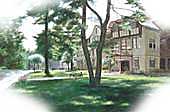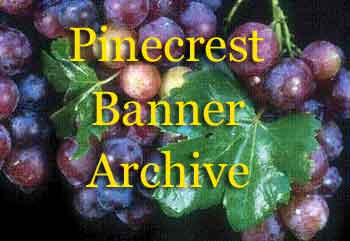Summer
1989
The Voice of
One Crying
Tom Worth
Teacher at Pinecrest
"Then said they unto him, Who art thou? that we may
give an answer to them that sent us. What sayest thou of thyself?
He said, I am the voice of one crying in the wilderness, Make
straight the way of the Lord, as said the prophet Esaias"
John 1:22-23.
Notice that John the Baptist identified himself as being
the voice of another. Here was a true prophet indeed. While
the rest of Israel were involved in their day-to-day activities,
John abode alone in the wilderness. During this time, God
began to speak, but only John heard. He became the embodiment
of He who was crying, as prophesied by Isaiah.
"The voice of him that crieth in the wilderness, Prepare
ye the way of the LORD, make straight in the desert a highway
for our God. Every valley shall be exalted, and every mountain
and hill shall be made low: and the crooked shall be made
straight, and the rough places plain: And the glory of the
LORD shall be revealed, and all flesh shall see it together:
for the mouth of the LORD hath spoken it." Isaiah 40:3-5.
This urgent, joyful passage from Isaiah is one that not
only foretells and characterizes the ministry of John the
Baptist, but gives us a glimpse into the burden and expectation
of the Holy Spirit. The Spirit of God is the "Him"
of whom John was but "the voice." Let us not stop
at "the voice," but let us follow through to "Him,"
the person behind this voice in the wilderness.
He is the one who was brooding upon the face of the waters
when darkness was upon the face of the deep, making ready
for the time when God would say, "Let there be light."
He was the one who was brooding upon the darkened nation of
Israel, stirring, wooing, preparing for a much more glorious
illumination than the creation of light; God was about to
reveal His Son, Jesus. This is the reason for the joy and
urgency in the cry of the Spirit in Isaiah's prophecy. Joy
in that God's Son, the Glory of the Lord, was about to be
revealed: Urgency in that there needed to be a people who
were prepared to receive this revelation.
This expectation and burden of the Holy Spirit became John's
as he came to a "watershed" in his life. He was
filled with the Spirit, even from his mother's womb. That
was something over which he exercised little choice. The choice
came in John's life when he heard "Someone" calling
in the wilderness. Though no one else seemed to be aware of
what he was hearing, or to even care, he separated himself
to this One who was calling. From that time forth, he "was
in the deserts until the day of his showing to Israel"
Luke 1:80b. In the crucible of the wilderness, the cry of
God was worked into his being until he became His voice.
Today, these words of Isaiah are again coming to pass: "For,
behold, the darkness shall cover the earth, and gross darkness
the people" Isa 60:2a. God is pouring out His Spirit
in these last days because the rest of this prophecy is about
to take place: "But the Lord shall arise upon thee and
His glory shall be seen upon thee" Isa 60:2b. As in the
days of John the Baptist, there is one who is crying in the
wilderness today, saying; "Prepare ye the way of the
Lord."
John was filled with the Spirit "from his mother's
womb." But, he was not "a man sent from God"
(John 1:6) until after a choice came in his life, when he
heard "One" calling in the wilderness. He listened,
then drew aside and separated himself to the Spirit of God.
He met Him in the wilderness.
Today, we are at this very place of choice. The Lord has
filled us with the Spirit, but this is only the beginning.
We will never be "sent from God" unless we meet
with Him, in the wilderness. If we stop short of this, we
maybe sent of ourselves; we may be sent by an organization;
but we will not be sent from God.
What is the wilderness? This "wilderness" in which
God is interested, is not the waste places of some far continent.
Nor is it a dryness of soul, the product of our own waywardness.
Rather, the "wilderness" in which God is interested
is purely a "separated place" where we can begin
to cultivate a sensitivity to hearing the cry of the Lord.
This cry speaks of His desires, the present burden of His
heart. This place of "wilderness" is where we can
be separated unto the Lord Himself, that the burden of the
Lord may be worked into our lives. Simply, it is a place of
"becoming."
Both Matthew and Mark record that John's food consisted
of locusts and wild honey. Locusts speak of God's judgments,
either against His people, as in Joel, or against another,
as with the plagues of Egypt. Eating locusts therefore, speaks
of an identification with the people to whom we are called,
by partaking of the judgment upon them. This is the mark of
a true prophet, but more than that, it is the mind of Christ.
Identifying with our brethren does not mean that we will
loose what we havein the Spirit, but it means that we shall
win Christ! Therefore, eating locusts is identifying ourselves
with God, who has identified Himself with manin Jesus Christ.
"Let this mind be in us" (Phil. 2:5-8), is the admonishment
of the Apostle Paul.
Wild honey speaks of the un-adulterated word of God. Eating
wild honey is a partaking of the Word of the Lord that is
instrumental in a prophetic call or commission. When Ezekiel
had eaten the scroll that tasted like honey, he was old by
the Lord to go to the house of Israel and to speak "My
words" (Exodus3:4). When John the disciple, whom Jesus
loved, had eaten the little book that tasted like honey, he
was told by the angel, "Thou must prophesy again before
many peoples, and nations, and tongues, and kings" Rev
10:11. When we meet with God in the wilderness, let us not
only partake of the honey of His word, but let us also partake
of His heart, though it seems like eating locusts.
Why is John the Baptist and the wilderness that he experienced
so important to us today? Because John stands as an example
of what Jesus called, "A prophet? yea ... more than a
prophet" for he was a witness sent before His face. "Behold,
I will send my messenger, and he shall prepare the way before
me: and the Lord, whom ye seek, shall suddenly come to his
temple, even the messenger of the covenant, whom ye delight
in: behold, he shall come, saith the LORD of hosts" Malachi
3:1. This is the calling of all upon whom the Spirit of the
Lord has come.
At an hour when there are those coming in the name of the
Lord and saying, "Follow me," John stands out as
a symbol of a true witness. He proclaimed neither himself
nor anything else, but the One to come Who would indeed say,
"Follow Me!" The enemy would like present day ministry
to fall into the trap of mistaking itself to be the end, rather
than being a means to the end. John the Baptist's ministry
was a temporary one, but he accomplished what he was sent
to do: he bore witness of the Light, the Lord Jesus Christ.
This is to be the function of all who are led by the Spirit.
"And it is the Spirit who bears witness, because the
Spirit is the truth" 1 John 5:7, NASV.
The church today is at the juncture of two ages, just as
it was almost twothousand years ago. The burden and desire
of God is that His Son, "the brightness of His Glory"
(Heb. 1:3), be revealed; to us, in us, among us, and ultimately,
at His second coming, to the whole earth. The Spirit of God
is being poured out upon all flesh, preparing for the time
when all flesh shall ee the Glory of the Lord. "And the
glory of the LORD shall be revealed, and all flesh shall see
it together: for the mouth of the LORD hath spoken it"
Isa40:5.
Those who listen for the cry of the Spirit, and partake
thereof, shall be instrumental in the revelation of God's
Glory, the Lord Jesus Christ. John the Baptist who had undergone,
in the wilderness, a time of preparation, recognized Jesus
and announced Him to all. "The next day John seeth Jesus
coming unto him, and saith, Behold the Lamb of God, which
taketh away the sin of the world. This is he of whom I said,
After me cometh a man which is preferred before me:for he
was before me" John 1:29-30.
Today, those who make this choice when they hear God calling
and go to Him in the wilderness, will become the voice of
the One who is presently crying there. These will become witnesses,
sent from God Himself, "to bear witness to the Light,
that all men through Him might believe" John 1:7.


